Tax On Soft Drinks Will Worsen Smuggling - Hwende

Chalton Hwende, a Member of Parliament for Kuwadzana East constituency, has expressed concern that implementing a tax on soft drinks would lead to increased smuggling. The Minister of Finance, Economic Development and Investment Promotion, Professor Mthuli Ncube, recently proposed introducing this tax in the 2024 National Budget. He said the aim is to generate revenue and discourage the consumption of high-sugar beverages.
However, Hwende who is also a member of the Citizens Coalition for Change (CCC), believes that due to the country’s porous borders, traders will turn to informal imports from countries like South Africa. As these imported products would be cheaper than locally produced ones, it may harm local businesses. He said:
A levy on the sugar content of beverages is going to lead to many job losses from Manufacturers to sugar cane farmers. Consumers will also be affected as most companies are likely to pass the burden to the already overtaxed citizens The proposed levy is US$0.02 per gram of sugar in beverages, excluding water.
FeedbackIf we don’t fight it next week during the budget debate the levy will take effect from January 1, 2024. As a country do not have an obesity issue but malnutrition is our biggest problem with many families struggling to have two meals. The tax level of US2c\g is very heavy. It will affect the current sales volumes of Beverages manufacturing companies. Using the 300ml Coca-Cola bottle as an example (which has 35g of sugar content) the proposed tax levy will lead to a total tax of US 70c – a ridiculous level of tax for a product selling for US25c, implying the consumer will pay US95-US110c per 300ml bottle after factoring VAT and retail margins.
Traders will resort to informal import from countries like SA given the porous borders because such products will be cheaper than the local produce, pushing out local businesses. Sugar companies will be forced to scale down threatening thousands of jobs and even sugarcane farmers. Producers will most likely move to artificial sweeteners in place of sugar.
HOT DEALS:
itel A70 - (128GB, 3GB RAM) $89,
itel A70 - (256GB, 4GB RAM) $99
itel P40 (128GB, 4GB), (6000mAh) $99
itel P40 (64GB, 4G), (6000mAh) $93
Cash on Delivery in Harare & Bulawayo. Tinotumira kwamuri inosvika.WhatsApp: 0783 450 793
The budget has received criticism, especially for the higher taxes and new taxes that have been introduced. Some experts, like Professor Gideon Zhou from the University of Zimbabwe, who specializes in Governance and Public Management, have expressed concerns that the budget could have significant negative effects. He said:
Indeed, a very extractive budget informed by the canons of austerity. However, extracting revenue from an already over-taxed and poverty-ridden citizenry looks like a recipe for far-reaching worse-off livelihood future scenarios. We are at risk of compromising the concerns of Vision 2030 which envisages not only a HEALTHY ECONOMY but a HEALTHY SOCIETY as well. The 2024 Budget seems to be leaving society behind in its efforts to steer the economy towards a middle-income ranking.
The public has been urging Members of Parliament to reject the Budget, but some senior government officials have publicly supported it. Dr. John Mangudya, the governor of the Reserve Bank of Zimbabwe, has stated that raising revenue through taxes is necessary because Zimbabwe’s access to credit from international institutions is decreasing. He believes that this is the only viable option for the country to fulfil its financial responsibilities.
More Pindula News
Tags
26 Comments
Leave a Comment
Generate a Whatsapp MessageBuy Phones on Credit.
More Deals





